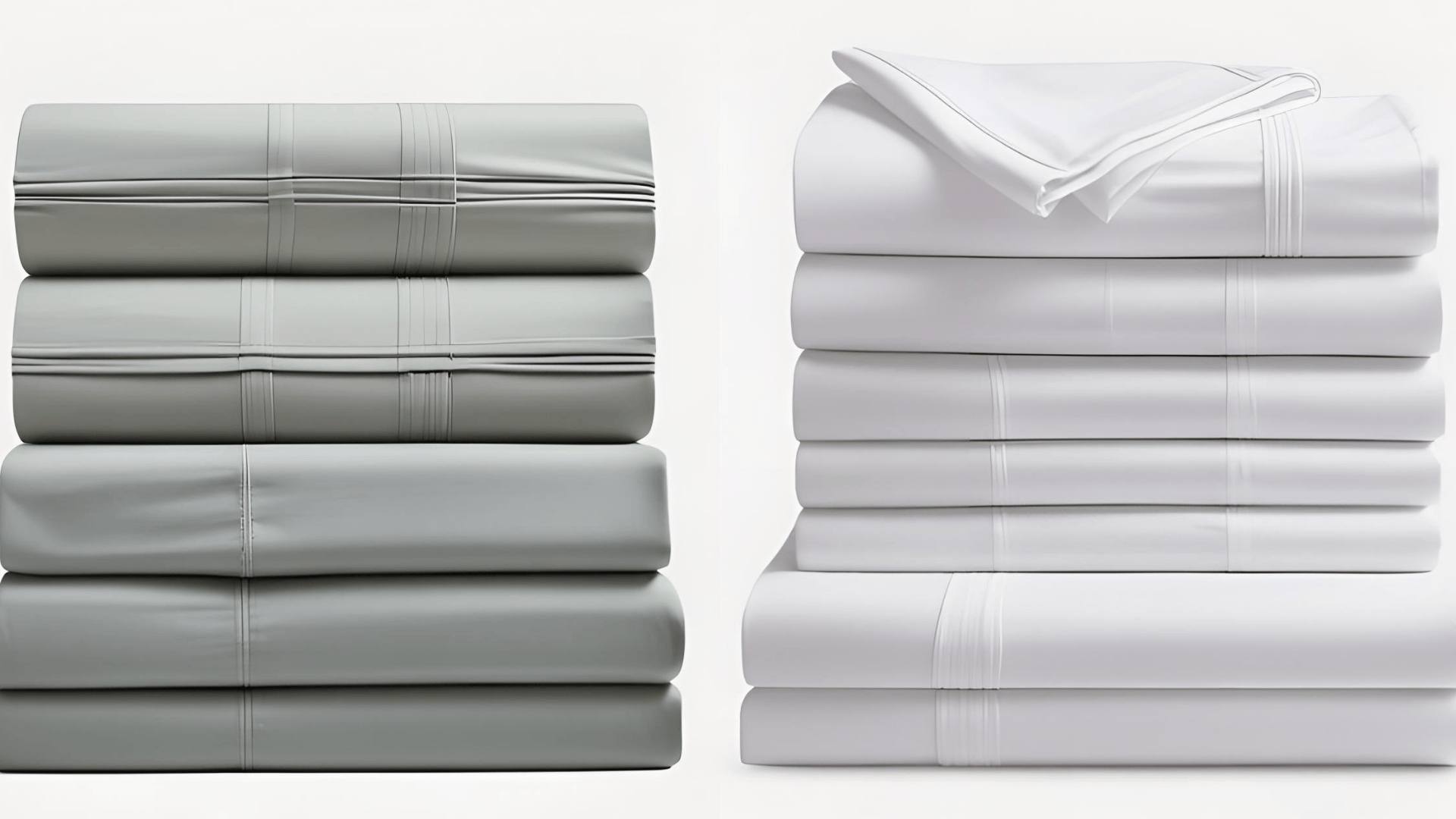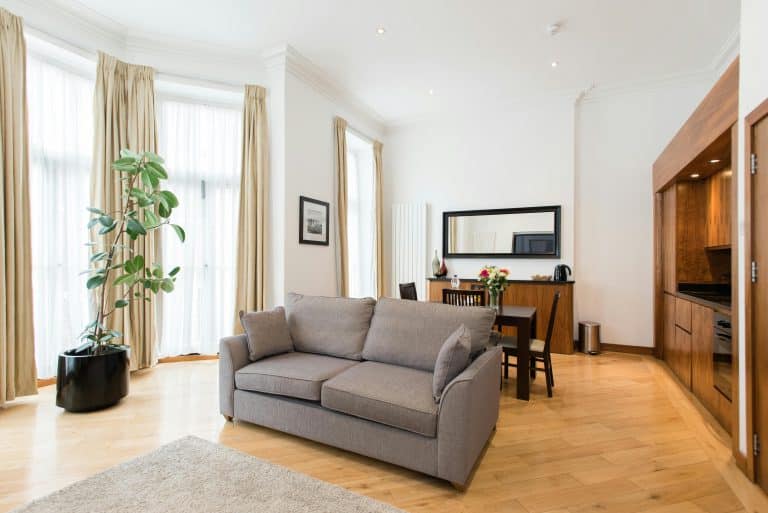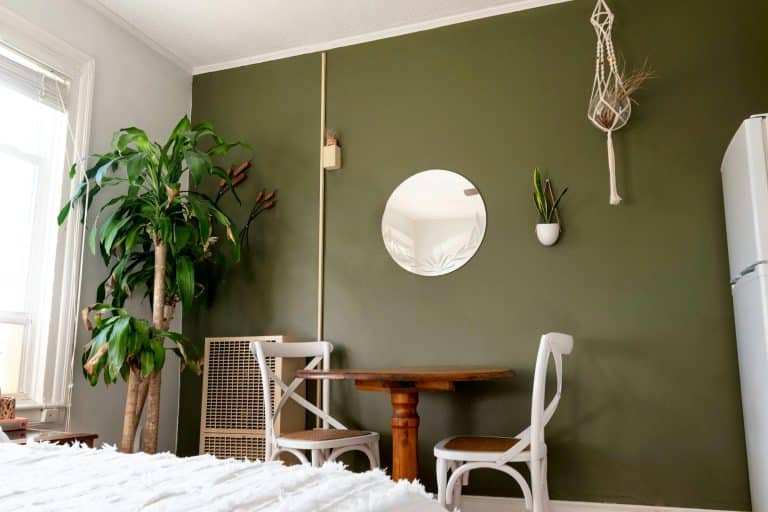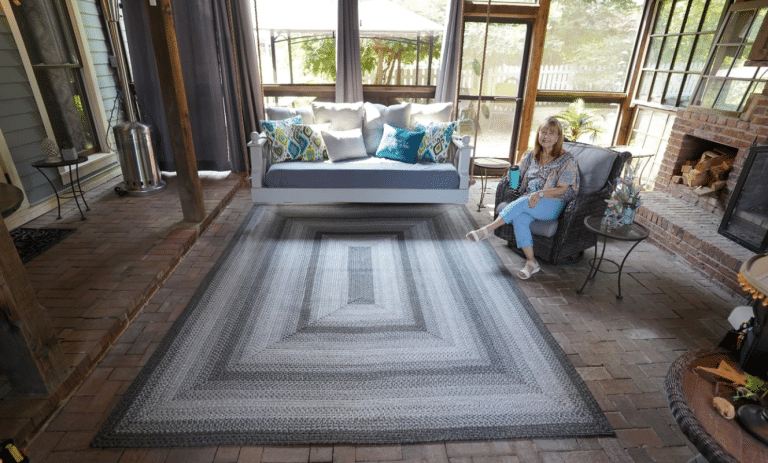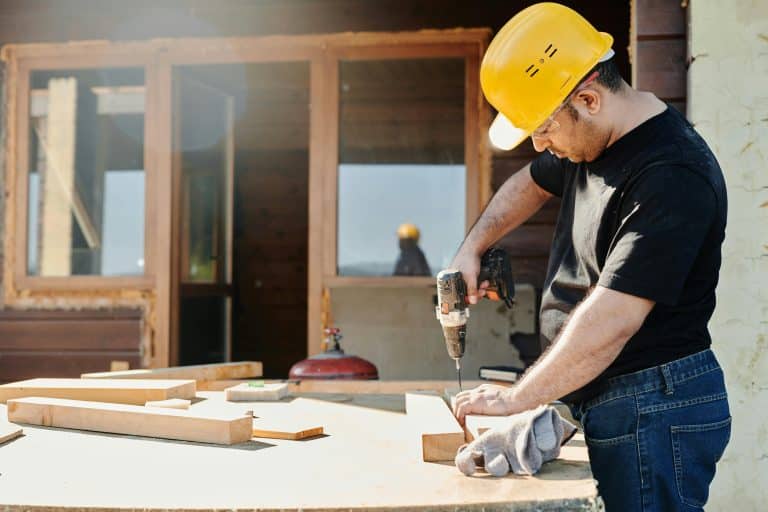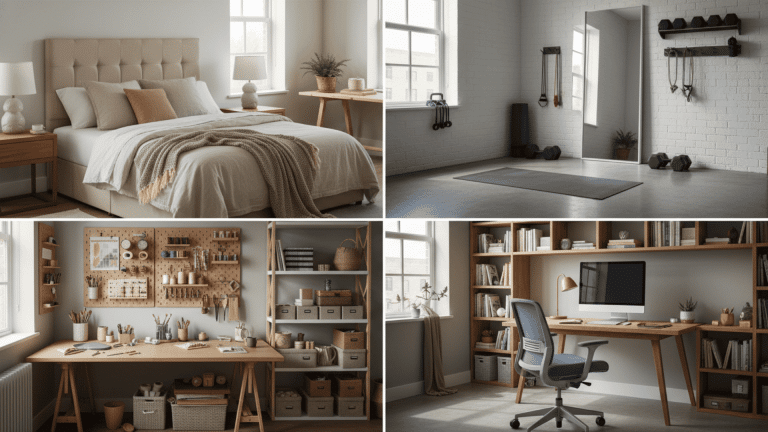Bamboo vs Egyptian Cotton: Which Is Better to Speep?
Your choice of bed sheets affects your sleep quality every single night. Poor sheets can leave you hot, sweaty, or uncomfortable for hours.
Good sheets help you sleep better and wake up refreshed. Two popular luxury options stand out: bamboo and Egyptian cotton sheets.
Both promise comfort but work in different ways. Bamboo sheets offer cooling properties and eco-friendly benefits. Egyptian cotton provides lasting luxury and classic softness.
Many people struggle to choose between these premium materials. This guide compares both types in detail. You’ll learn about comfort, durability, cost, and environmental impact.
By the end, you’ll know exactly which sheets match your sleep needs and budget.
What Are Bamboo Sheets?
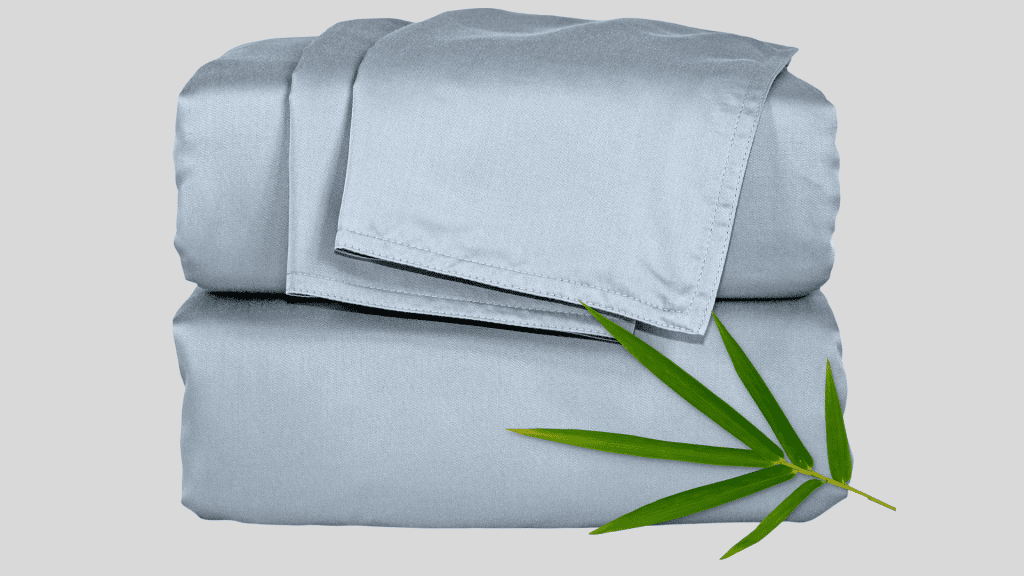
Bamboo sheets come from the fast-growing bamboo plant. This natural grass grows quickly without pesticides or much water. Manufacturers turn bamboo into soft fabric through three main methods.
Bamboo viscose uses chemicals to break down the plant fibers. Bamboo lyocell creates fabric through a closed-loop process that reuses chemicals.
Bamboo linen keeps the natural texture of the plant. These sheets offer an eco-friendly choice for your bedroom. Bamboo grows back after cutting without replanting.
This makes it better for the planet than regular cotton farming.
Types of Bamboo Sheets
- Bamboo Rayon (Viscose) – The most common type that feels soft and silky but requires heavy chemical processing to create.
- Bamboo Lyocell – A cleaner production method that makes smooth, breathable sheets with a better environmental impact.
- Bamboo Linen – Keeps the natural texture of bamboo for a crisp, airy feel that’s less smooth than other types.
- Blended Bamboo – Combines bamboo with cotton or synthetic materials to lower costs, but reduces the natural benefits.
Bamboo Sheets Pros & Cons
| Pros | Cons |
|---|---|
| Eco-friendly & sustainable growth. | It can be expensive, especially the lyocell type. |
| Naturally hypoallergenic & antibacterial. | Prone to wrinkling. |
| Moisture-wicking & breathable for hot sleepers. | Requires gentle washing to maintain quality. |
| Ultra-soft, silk-like feel. | The market was flooded with lower-quality blends. |
What Are Egyptian Cotton Sheets?
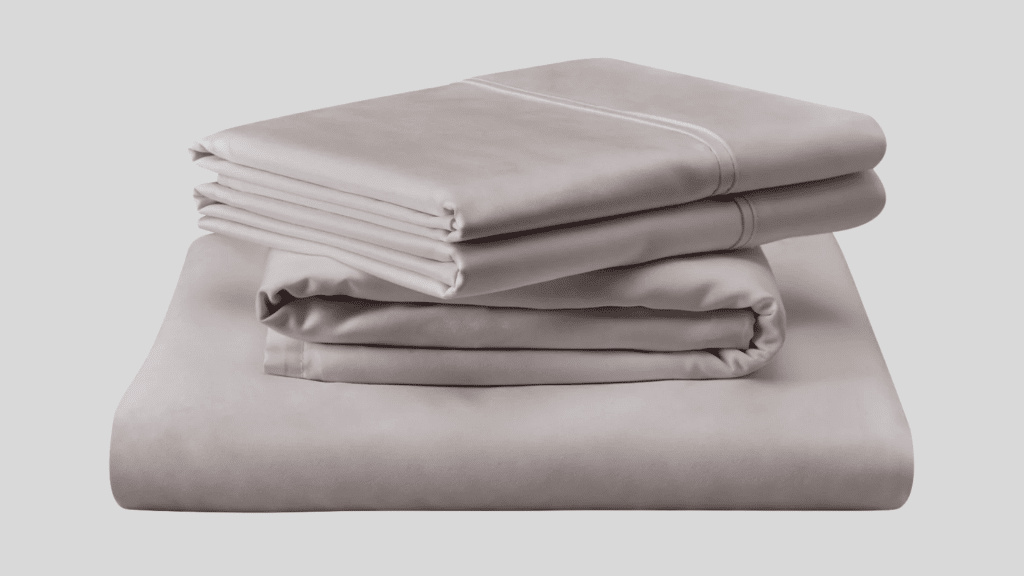
Egyptian cotton sheets come from cotton grown in Egypt’s Nile Delta region. The special climate and soil create long-staple fibers that are stronger and softer than regular cotton.
These long fibers allow manufacturers to create finer threads and higher thread counts. The weaving process turns these quality fibers into smooth, strong fabric.
Egyptian cotton has built a reputation for luxury over many years. Hotels and high-end brands choose it for its softness and long-lasting quality.
The sheets get softer with each wash while keeping their strength.
Types of Egyptian Cotton Sheets
- Percale Weave – Creates a crisp, cool feel that breathes well and works best in hot weather or for warm sleepers.
- Sateen Weave – Produces a silky, shiny surface that feels warmer and suits cooler climates or cold sleepers.
- Twill Weave – Makes heavy, strong sheets that resist wrinkles and last longer with regular use.
- Blended Egyptian Cotton – Mixes real Egyptian cotton with other fibers to cut costs, but loses some luxury quality.
Egyptian Cotton Sheets Pros & Cons
| Pros | Cons |
|---|---|
| Exceptional durability; resists pilling. | High cost for authentic Egyptian cotton. |
| Luxurious feel; softens with every wash. | Many counterfeits in the market. |
| Breathable in most climates. | Wrinkles easily, especially in percale weave. |
| A variety of weaves for different preferences. | Longer “break-in” period before maximum softness. |
Bamboo vs Egyptian Cotton: The Key Differences
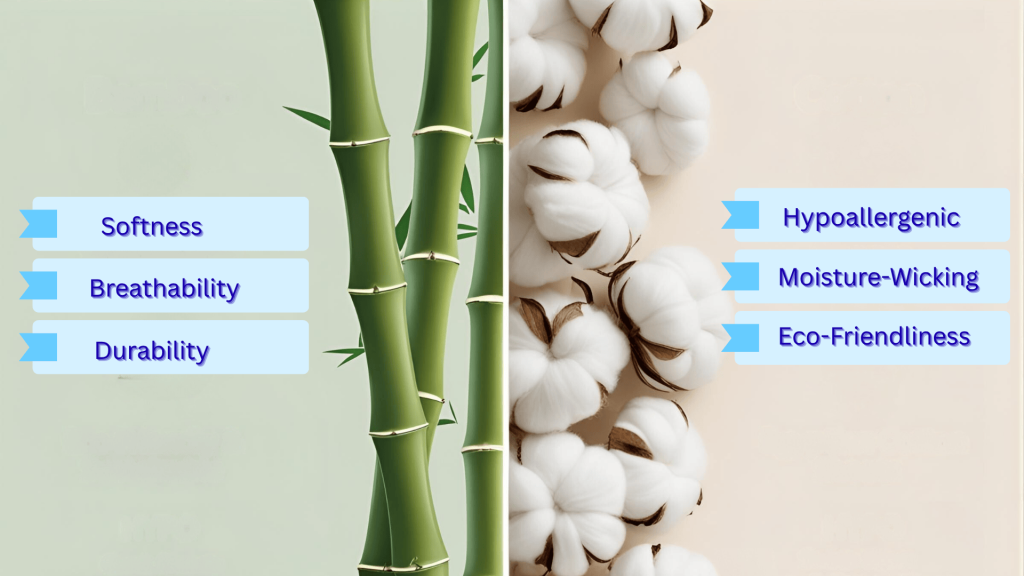
A quick side-by-side look at how these two premium sheet fabrics compare in softness, breathability, durability, price, and sustainability.
1. Softness
Bamboo sheets feel silky-smooth right from the first use. They offer gentle comfort againstthe skin without needing a break-in period. The natural smoothness stays consistent over time.
Egyptian cotton starts crisp but becomes softer with each wash. It develops a luxurious feel after several uses. The sheets can take weeks to reach their maximum softness.
2. Breathability
Bamboo provides excellent airflow that keeps you cool all night. Natural ventilation prevents heat buildup during sleep. These sheets work great for hot sleepers and warm climates.
Egyptian cotton offers very good air circulation in most conditions. Percale weave gives the best cooling properties. Sateen weave can trap more heat than other types.
3. Durability
Bamboo sheets offer a good lifespan with proper care and washing. They can last 2-3 years with regular use. The material may show wear faster than premium cotton options.
Egyptian cotton provides excellent long-term performance and strength. Quality sheets can last 5-10 years with proper maintenance. The fabric resists pilling and maintains its structure well.
4. Hypoallergenic Properties
Bamboo naturally resists dust mites and bacteria buildup. It makes a great choice for sensitive skin and allergies. Anti-microbial properties help reduce odor problems.
Egyptian cotton offers moderate protection that depends on proper cleaning. Regular washing removes most allergens from the fabric. The material is not naturally resistant to dust mites.
5. Moisture-Wicking
Bamboo pulls sweat away from your body effectively. It keeps you dry throughout the entire night. Quick-drying properties prevent dampness and discomfort.
Egyptian cotton provides moderate moisture management in most cases. Percale weave handles sweat better than sateen options. Some types may retain moisture in humid conditions.
6. Eco-Friendliness
Bamboo offers high sustainability with fast-growing plants. Production uses less water and no harmful pesticides. The material is biodegradable and completely renewable.
Egyptian cotton has a low to moderate environmental impact overall. Traditional cotton farming consumes a significant amount of water resources. Egyptian cotton requires particular growing conditions.
Bamboo vs Egyptian Cotton: Cost and Value Breakdown
| Price & Value | Bamboo Sheets | Egyptian Cotton Sheets |
|---|---|---|
| Average Price | $50 – $200 | $100 – $500+ |
| Value | Affordable luxury, eco-friendly, good durability. | Premium luxury; very long-lasting when authentic. |
Which Should You Choose?
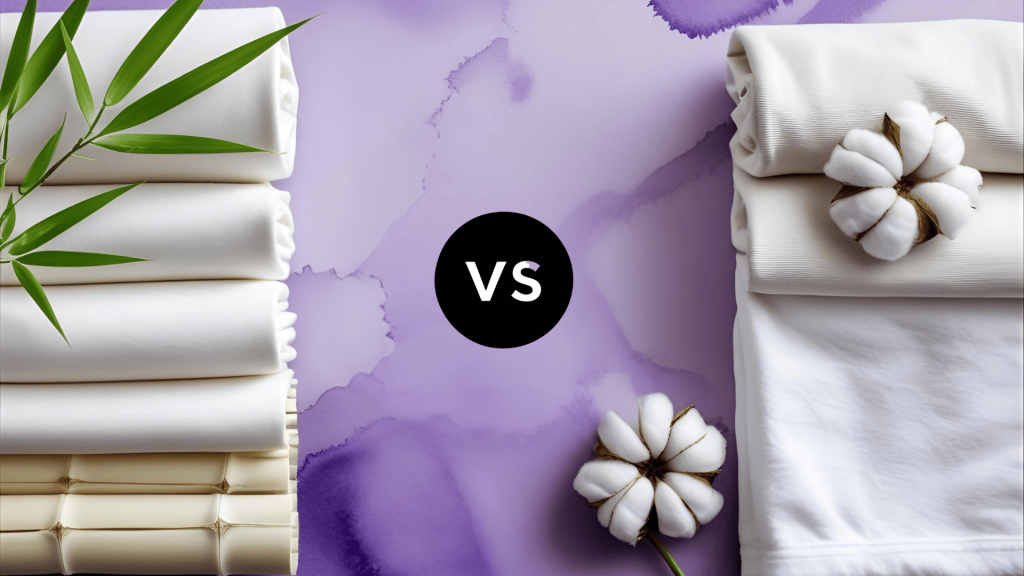
Choose bamboo sheets if you sleep hot, care about the environment, or have allergies.
These sheets keep you cool all night and resist dust mites naturally. They work well for people who want sustainable bedding options.
Pick Egyptian cotton sheets if you want a luxury feel, long-lasting quality, or year-round comfort.
These sheets get softer over time and can last many years. They suit people who prefer classic bedding and don’t mind higher costs.
Wrapping It Up
Both bamboo and Egyptian cotton sheets offer quality sleep experiences in their own ways. Bamboo sheets excel at cooling, sustainability, and natural allergy protection.
Egyptian cotton sheets provide long-lasting luxury and classic comfort that improves over time. Your choice depends on your sleep style, values, and budget.
Hot sleepers and eco-conscious buyers often prefer bamboo options. Luxury seekers and durability lovers typically choose Egyptian cotton.
Consider your climate, skin sensitivity, and long-term needs before deciding. Quality matters more than the material type in many cases.
Read reviews and check authenticity when shopping for either option. Great sleep starts with sheets that match your personal needs perfectly.
Love decorating? Find more home decor inspiration you’ll adore.
Frequently Asked Questions
What Is the Downside to Bamboo Sheets?
Bamboo sheets can be expensive, wrinkle easily, and require gentle washing to maintain their softness and quality.
Which Is Better, Cotton or Bamboo?
Bamboo works better for hot sleepers and eco-conscious buyers, while cotton offers more durability and a classic luxury feel.
Is Bamboo Better for Skin than Cotton?
Yes, bamboo naturally resists bacteria and allergens, making it gentler for sensitive skin and allergy sufferers.
Can You Put Bamboo Sheets in the Dryer?
Yes, but use low heat settings and remove them while slightly damp to prevent damage and maintain softness.

